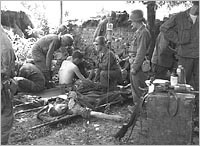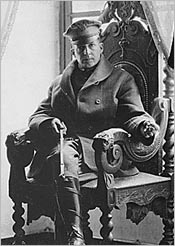 |
 |
 |
|||
 |
Home | Cold War Turns Hot | The Armed Forces Integrate | What the Experts Say | |||
|
The Cold War Turns Hot
MacArthur's Bold Move
It was the first of September, 1950, two months after the North Korean army stormed across the border at the 38th Parallel into South Korea. United Nations forces, thousands already dead and wounded, had been beaten back into the southeast corner of the Korean peninsula. There, 100,000 troops under the U.S. 8th Army fought to avoid being pushed into the sea, while more forces steamed across the Pacific. President Truman sounded a note that may have seemed too optimistic, given the facts on the ground. "We believe the invasion has reached its peak. The task remaining is to crush it. Our men are confident, the United Nations command is confident, that it will be crushed. The power to do this is being gathered in Korea." That wasn't just rhetoric. Truman and the Joint Chiefs of Staff had just approved a plan conceived by General Douglas MacArthur: a bold amphibious landing far behind enemy lines on the west coast of South Korea at the port of Inchon. The Joint Chiefs had reluctantly recommended approval of the plan after a meeting with MacArthur in Tokyo. Alexander Haig, then a young aide to MacArthur's chief of staff, remembers being "a fly on the wall" at that meeting - sitting outside a door left ajar and taking notes. The Joint Chiefs were "vehemently opposed" to MacArthur's Inchon plan, Haig recalls. "They thought it was far too risky." In the Tokyo meeting, the chiefs of the Army and Navy told MacArthur that Inchon was too far behind enemy lines. The port's narrow channel would make the Marines sitting ducks. Its dramatic tides would make the timing too tricky.
"He had been a general in World War I!" Haig points out. "So he was viewed by the military as some kind of a demigod - or somebody who had to be brought down to earth." In later accounts of the meeting, MacArthur and the Joint Chiefs would say that the general offered a long, reasoned argument for why the Inchon landing would work. Haig remembers it differently: "After all of these expressions of resistance, I recall his taking his pipe out and putting it in the ashtray and standing up and saying 'Gentlemen, I'll land in Inchon on the 15th of September or you'll have a new commander.' And he walked out of the room and all opposition crumbled." Next: Decisive Moment
|
||||

